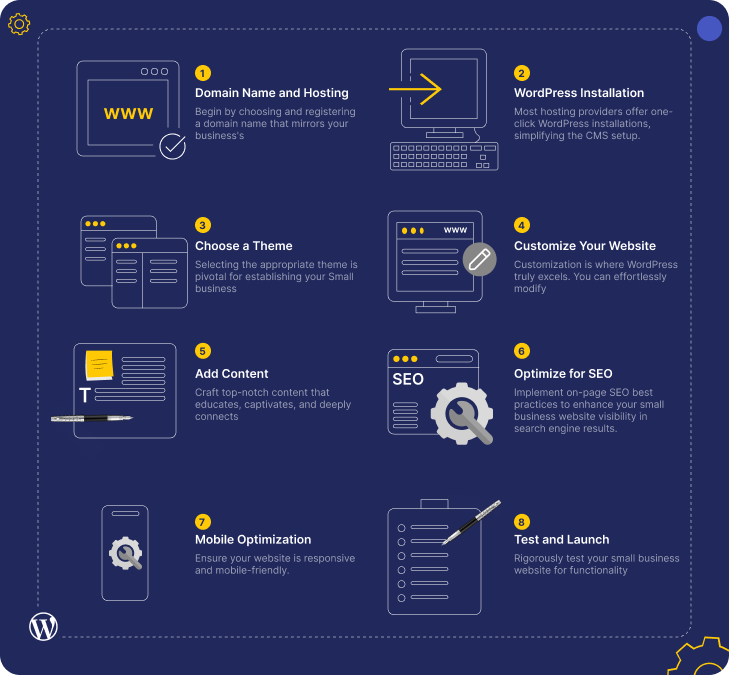Utilising WordPress for Your Small Business Endeavors

In the ever-evolving landscape of business, the digital realm stands as a formidable arena, where the success of small enterprises is often determined by their online presence. Enter WordPress, a versatile and user-friendly platform that has emerged as a beacon of hope for small businesses seeking to establish their mark in the vast sea of the internet. As we embark on this journey into the world of utilizing WordPress for small businesses, we'll uncover the invaluable tools and strategies at your disposal, equipping you to navigate these uncharted waters with confidence and competence. Famous websites like BBC America. TED Blog, Microsoft News, Angry Birds, Sony Music, etc. have been built using WordPress.
WordPress offers a wide array of features and functionalities that can empower small businesses to thrive and prosper. From crafting visually captivating and responsive websites to optimizing them for search engines and seamlessly integrating e-commerce solutions, WordPress is a versatile ally that ensures your business not only survives but thrives in the digital age. Throughout this blog, we'll unravel the potential of WordPress, providing you with practical insights, tips, and best practices that will aid in your journey toward establishing a robust online presence and achieving your business objectives. So, join us as we embark on this voyage, and let WordPress be your trusted vessel in the digital realm.
1. Cost-Effective Solution
Small businesses often operate within tight budgets, prioritizing cost-effectiveness. WordPress, being an open-source content management system, is a cost-free solution. You won't need to invest in expensive software licenses or proprietary platforms. Furthermore, there is a wide array of free and premium themes and plugins available, enabling you to customize your website without straining your finances.
2. The Open Source Powerhouse
WordPress proudly stands as an open-source powerhouse, generously offering its source code to all, paving the way for boundless creativity, innovation, and sharing. This fostering of an ever-thriving developer community ensures continuous enhancements and limitless possibilities, rendering it a dynamic and budget-friendly solution for websites of all kinds.
3. The Worldwide Web's WordPress
A Browser-Based Marvel In a world where connectivity reigns supreme, WordPress emerges as a browser-based marvel, permitting website management from anywhere with a simple internet connection. This inherent flexibility negates the need for complex software installations and paves the way for seamless content updates, making it the top choice for website owners, especially those on the go.
4. Your All-in-One Virtuoso
Embracing WordPress means embracing a comprehensive and self-sufficient ecosystem that effortlessly handles all your website's demands, from content management to user authentication and beyond. It's the ultimate all-in-one solution that liberates you from the shackles of third-party platforms, streamlining your web management process.
5. User-Friendly Interface
Not everyone possesses web development expertise, and this is where WordPress truly shines. Its intuitive interface caters to individuals with varying levels of technical knowledge. You can effortlessly create and update content, add images, and manage your small business website's functionality without requiring coding skills.
6. SEO-Friendly
Optimizing your website for search engines, commonly known as SEO, serves as a key factor in elevating your site's prominence on search platforms like Google. WordPress inherently lends itself to SEO-friendliness, featuring clean code, customizable permalinks, and easy integration of SEO plugins like Yoast SEO. This facilitates your small business website's ascent in search engine results, attracting more organic traffic.
7. Your Website, Your Rules:
WordPress's Empowering Autonomy Within the realm of WordPress, you reign as the supreme administrator, wielding absolute authority over your digital domain. From crafting and editing content to orchestrating user interactions and sculpting your site's appearance, this unparalleled autonomy empowers you to manifest your online presence precisely as you envision.
8. A Myriad of Aesthetic Choices at Your Fingertips
The WordPress library beckons with an eclectic array of themes, each a gateway to transforming your website's ambiance with a mere click. Whether your heart yearns for a sleek and professional design or a vibrant and artistic layout, a theme awaits that mirrors your vision perfectly.
9. Your Blogging Ally Embarking on a Blogging Journey
WordPress is nothing short of a delightful breeze. Its user-friendly interface and robust content management tools streamline the process of sharing your articles, images, and videos with the world. Whether you're a seasoned blogger or just dipping your toes into the blogosphere, WordPress simplifies the art of expressing your thoughts and ideas.
10. A Universe of Plugin Possibilities
With a galaxy of plugins at your disposal, WordPress extends its functionality to cater precisely to your unique needs. From e-commerce solutions to seamless social media integration, these add-ons open the door to a boundless world of enhancements, elevating your site's capabilities and performance to unprecedented heights.
How to Choose a WordPress Hosting Provider as a Small Business?
Using WordPress for your small business website and selecting the optimal impact on your site's performance, security, and overall user experience. Here are some factors to contemplate when choosing the best WordPress hosting for your small business:

1. Reliability and Uptime
Downtime can be detrimental to small businesses. Seek a hosting provider that offers a high uptime guarantee, ensuring your website remains accessible to visitors 24/7. Reliability is paramount in building trust with your audience. A very good reason for adopting WordPress for small businesses
2. Speed and Performance
Swift-loading websites are essential for retaining visitors and boosting search engine rankings. Opt for a hosting provider that provides solid-state drives (SSDs), content delivery networks (CDNs), and other performance-enhancing features to guarantee prompt loading times.
3. Scalability
As your small business expands, your website's demands may evolve. Many times this comes faster than expected, as it is difficult to gauge the rate of growth of the business. This is due to the conducive present-day environment. Opt for a hosting provider that supports scalability, enabling you to seamlessly upgrade your hosting plan as your traffic and resource requirements increase.
4. Security Measures
Security holds utmost importance in today's digital landscape. There are innumerable number of cases of websites being hacked. This results in downtime, which is detrimental to small business websites. Ensure that your hosting provider offers robust security measures, including malware scanning, firewalls, and regular backups, to safeguard your website and customer data.
5. Customer Support
Small business owners frequently require assistance with technical issues or inquiries about their hosting environment. Opt for a hosting provider with responsive customer support capable of addressing your concerns swiftly.
Some renowned hosting providers recognized for their compatibility with WordPress include Bluehost, SiteGround, and WP Engine. Conduct research and
comparisons to determine the most suitable option for your small business's needs and budget.
How to Build a Small Business Website with WordPress?
Now that you've selected the optimal hosting provider, it's time to embark on the journey of constructing your small business website with WordPress. Follow these WordPress development steps to get started:

1. Domain Name and Hosting
Begin by choosing and registering a domain name that mirrors your business's identity. Seek assistance from your hosting provider, as they can be invaluable in facilitating this procedure. Ensure your domain name is memorable, relevant to your business, and easy to spell.
2. WordPress Installation
Most hosting providers offer one-click WordPress installations, simplifying the CMS setup. Upon successful installation of WordPress, you'll gain entry to the admin dashboard, your hub for overseeing the content, design, and functionality of your website.
3. Choose a Theme
Selecting the appropriate theme is pivotal for establishing your small business website's online identity. WordPress boasts an extensive collection of both free and premium themes, tailored to diverse industries and design preferences. Choose a theme that aligns with your brand and provides the features you require.
4. Customize Your Website
Customization is where WordPress truly excels. You can effortlessly modify your website's appearance and functionality using themes and plugins. Consider hiring a web designer or developer if advanced customization is needed beyond your skill set. This is an outstanding aspect of WordPress for small businesses.
5. Add Content
Craft top-notch content that educates, captivates and deeply connects with your specific target audience. Consistently update your blog, product or service pages, and other relevant sections of your website to encourage return visits to your small business website. Your primary focus should be on what important details a customer would seek, and the replies to the same.
6. Optimize for SEO
Implement on-page SEO best practices to enhance your small business website's visibility in search engine results. Utilize SEO plugins like Yoast SEO to optimize your content, meta tags, and URLs.
7. Mobile Optimization
Ensure your website is responsive and mobile-friendly. Given the increasing number of users accessing websites via smartphones and tablets, a mobile-optimized site is imperative for delivering a seamless user experience. Note that a visual experience on a PC could be much different than a mobile phone. Check this important aspect when allowing access to your small business website through a smartphone.
8. Test and Launch
Rigorously test your small business website for functionality, usability, and compatibility across various browsers and devices. Once you're confident in its performance, launch the WordPress website for your business to the world.
Can Small Businesses Succeed Over a Long Period with WordPress?
Your journey with WordPress doesn't conclude when your website goes live. The question of whether "Is WordPress good for a small business website" is much dependent on your follow-up actions. To maximize the benefits for your small business, it's essential to continuously monitor, update, and optimize your website. Discover these essential tactics for achieving success in your online ventures.
1. Regular Updates
Ensure that WordPress plugins and themes are kept up to date to maintain security and compatibility. Outdated software can pose vulnerabilities to your small business website.
2. Content Marketing
Consistently generate valuable and relevant content through blog posts, articles, videos, and other media forms. By doing so, you not only captivate your audience but also bolster your SEO endeavors. Try to keep the content precisely targeted and devoid of Fluff. This will result in a maximum impact.
3. Social Media Integration
Incorporate social media sharing buttons and widgets on your website to encourage visitors to share your content on their social networks. This can expand your reach and drive more traffic to your small business website.
4. Email Marketing
Collect email addresses from your website visitors and employ them in email marketing campaigns. Email is an effective means to nurture leads and retain customers. Email forwards result in a multiplier effect, which further leads to enhanced exposure of information.
5. Analytics and Tracking
Use tools like Google Analytics to monitor your website's performance, track user behavior, and gather valuable insights. This data can guide informed decisions for improvement.
6. Online Advertising
Gone are the days when billboards were the chosen form of advertising. The sight of these being pulled down is now a regular feature in our towns and cities. Consider using online advertising platforms such as Google Ads and Facebook Ads to reach a broader audience and channel targeted traffic to your small business website.
7. User Feedback
Encourage customer feedback and reviews on your small business site. Positive reviews build trust and credibility, while constructive feedback can guide improvements. It is a well-known fact that negative feedback is not welcome and could, at times, lead to disillusionment. It is important to gauge the true merit of such feedback. You may need external assistance to determine the ground reality before taking any corrective action.
8. E-commerce Integration
The E-commerce segment is an area that cannot be ignored in the present times. If you're selling products or services online, contemplate integrating an e-commerce plugin like Woo-Commerce to streamline the purchasing process and enhance your online sales.
| “Ready to take your business online? Explore our top-notch WordPress website development service and turn your vision into a stunning reality!” |
Conclusion:
WordPress for small businesses is more than just a platform; it's a helpful friend on your journey. Whether you're starting small or dreaming big, WordPress gives you the tools to create a great online presence. With features that make your site easy to find and use, you'll attract customers from all over. In WordPress, you've got a reliable partner for your business adventures, always ready to tackle the modern world with you.
FAQs
1. What are the advantages of using WordPress for a small business website?
While WordPress has many advantages as described in this blog, it's important to note that the choice of CMS depends on your specific needs and preferences. Other CMS (Content Management Systems) platforms, like Joomla, Drupal, and Magento, may be better suited for certain use cases, and the decision should be based on your project's requirements and your familiarity with the platform.
2. In today's fast-moving world, a website must stay relevant. How does WordPress ensure the same?
Adapting to changing technologies, staying ahead of best SEO practices, seeking audience feedback, collaborating with influencers and experts, and enhancing mobile friendliness are some of the important areas to keep a high level of relevance that is required. The effectiveness of a small business website is primarily driven by these parameters. WordPress helps you achieve the same with its myriad of built-in features.
3. Having used WordPress as a platform for my small business website, how do I ensure its continued availability for the various changes to be done in the long run?
Firstly, WordPress is an open-source, free-to-use platform. You are thus not saddled with expensive licenses etc. The basic purpose of such platforms is to be created for public use with a long-term vision. Therefore, apprehensions about long-term availability should not be a deterrent to using WordPress.
Related to this
Let's Discuss Your Project












